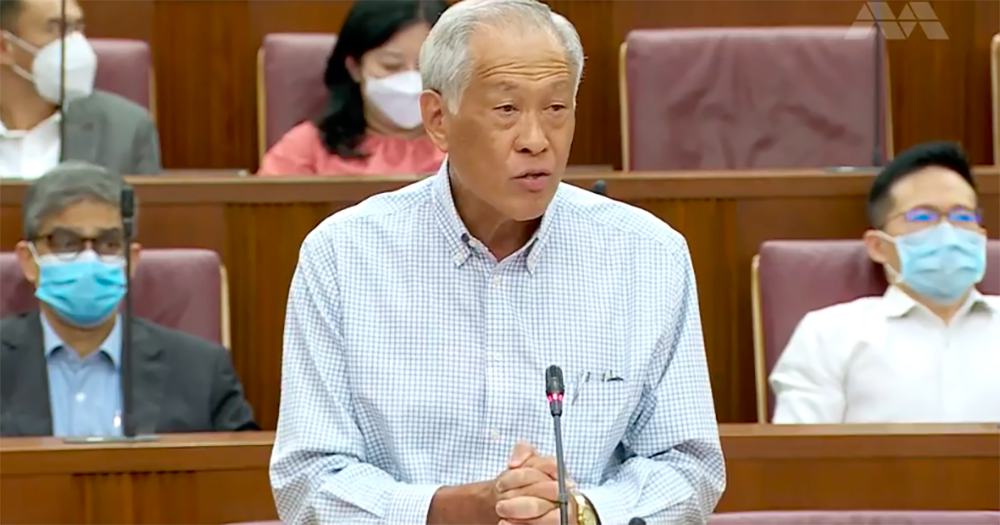Follow us on Telegram for the latest updates: https://t.me/mothershipsg
There are "distinct pitfalls" if National Service is introduced for reasons other than the critical need of military defence, be it for man or women, Defence Minister Ng Eng Hen said in Parliament on May 9.
Ng: Primary reason for NS must always be defending Singapore
Ng noted that the idea of introducing conscription for women for the sake of gender equality had been suggested "by some" during the debate on the White Paper on Singapore Women's Development, including a proposal to deploy female NS conscripts as nurses or teachers.
The minister noted that Singapore was now in a position of strength, with the SAF having maintained operational readiness through the optimisation of technology and resources, despite falling birth rates.
Ng said:
"The primary reason for enlistment into the SAF (Singapore Armed Forces) must remain to train a soldier who is able to defend Singapore; and to repel if not defeat an enemy who wants to invade our home.
Likewise enlistment into the Police and SCDF must be based on the national need for homeland security and emergency services.
This stark raison d'être of NS, to fight and defend our country, and to ensure its security, is the foremost consideration that must undergird the mandatory enlistment of all national servicemen."
He added that this primary reason is "very far off" from the proposals to conscript women to serve in roles such as caregivers and healthcare workers, or to send a sign of gender equality.
Such proposals are therefore "inadequate justifications" to mandate that a person must suspend individual liberties as a civilian, give up two years of his or her life and go to jail if they do not do so, as NS defaulters have been sentenced, he said.
Ng was responding to questions posed by Members of Parliament Carrie Tan and Poh Li San about the presence of women in the SAF and the considerations for their conscription.
Societal cost of conscripting women outweighs benefits
In addition, the societal cost of conscripting women "far" outweighs the benefits, Ng elaborated.
The minister explained:
"Women will be delayed in their entry into the workforce. The immediate effect will be an accentuated decline in the size of our local workforce, and reduction of household incomes. Even if women are enlisted for non-military NS roles to augment our healthcare and social services, it may make manpower shortages in other industries worse."
In the long run, the cost will not just be imposed on women, but on their families, children and spouses and society as a whole as well, he said.
"Is that cost justified to send a signal or to reverse stereotypes? From the Government's perspective, no. I think most Singaporeans would say no too, from a security perspective," he added.
The case of Ukraine
Ng highlighted that in the event Singapore faces an "existential threat" by an aggressor and has a sudden and great need to boost its military, he is certain that MINDEF and SAF will call on the government to conscript not just women but teenagers and older men as well to defend the country.
Here, the minister cited Ukraine as an example, noting that this what the country did when it was invaded.
"They required women employed in a wide range of professions, aged between 18 to 60 years, to register for possible military conscription. Young men and elderly, who were well past their retirement age, also volunteered to fight on the front lines to protect their country.
There was even a report published in Reuters, in February 2022, of a 79-year old Ukrainian woman who was filmed at a training ground handling a Kalashnikov assault rifle."
Ng added, "But we are not there today and hope never to be."
Ng: Servicewomen in the SAF are punching above their own weight
As for women who are already in the SAF, Ng said that some of the vocations they currently serve in include infantry, artillery, armour, combat engineers, pilots and naval officers.
Ng also pointed out that there are more than 1,600 uniformed servicewomen in the SAF who constitute over eight per cent of the regulars.
Over 500 women have also been trained and deployed as volunteers in the SAF Volunteer Corps (SAFVC) in a variety of roles since 2015.
Women also make up five per cent of regulars who hold the senior ranks of Lieutenant Colonel (LTC), Military Expert (ME) ME6, or Master Warrant Officer (MWO) and above.
"We hope to see this figure increase as the proportion of servicewomen in the SAF continues to grow," he said.
The SAF has also stepped up its recruitment of women as it wants more women to join its ranks and will make it more attractive for them to do so, the minister pointed out.
Steps that have been taken thus far include facilitating flexible work arrangements such as part-time, job-sharing and telecommuting where possible, without compromising operational readiness. W
Policies such as childcare and parent care leave have also been implemented to help servicemen and women take better care of their loved ones, along with counselling services to support their well-being.
The SAF also established the SAF Women Outreach Office (WOO) in July 2020 to focus on reviewing policies and creating a conducive and progressive workplace experience for servicewomen, he said.
Follow and listen to our podcast here
Top screenshot via CNA
If you like what you read, follow us on Facebook, Instagram, Twitter and Telegram to get the latest updates.
